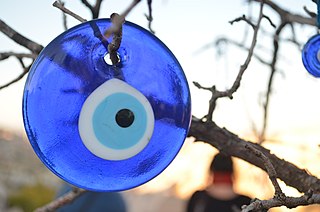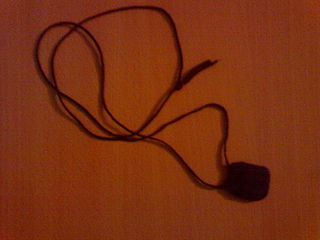Turk or Turks may refer to:

Laputa: Castle in the Sky, released as Castle in the Sky in North America, is a 1986 Japanese animated fantasy adventure film written and directed by Hayao Miyazaki. It was produced by Isao Takahata, animated by Studio Ghibli, and distributed by the Toei Company. In voice acting roles, the original Japanese version stars Mayumi Tanaka, Keiko Yokozawa, Kotoe Hatsui, and Minori Terada, while the 2003 English dub stars James Van Der Beek, Anna Paquin, Cloris Leachman, and Mark Hamill. The film follows orphans Sheeta and Pazu, who are chased by Muska, the army, and a group of pirates over Sheeta's crystal necklace. They discover that the crystal leads them to Laputa, a mythical castle flying in the sky, and join the pirates on their journey to reach the island before the military. Laputa turns out to harbor a dangerous weapons system, which Sheeta and Pazu destroy to halt Muska's destruction, causing Laputa to rise into space.

The evil eye is a supernatural belief in a curse brought about by a malevolent glare, usually given to a person when one is unaware. The evil eye dates back about 5,000 years. In the 6th century BC it appeared on Chalcidian drinking vessels, known as 'eye-cups', as a type of protective magic. It is found in many cultures in the Mediterranean region as well as Western Asia and Central Asia with such cultures often believing that receiving the evil eye will cause misfortune or injury, while others believe it to be a kind of supernatural force that casts or reflects a malevolent gaze back upon those who wish harm upon others. Older iterations of the symbol were often made of ceramic or clay; however, following the production of glass beads in the Mediterranean region in approximately 1500 BC, evil eye beads were popularised with the Phoenicians, Persians, Greeks, Romans and Ottomans.

In the Bible, Meshech or Mosoch is named as a son of Japheth in Genesis 10:2 and 1 Chronicles 1:5.

A kilim is a flat tapestry-woven carpet or rug traditionally produced in countries of the former Persian Empire, including Iran, the Balkans and the Turkic countries. Kilims can be purely decorative or can function as prayer rugs. Modern kilims are popular floor coverings in Western households.

Chad Muska is an American professional skateboarder, musician and entrepreneur. In November 2012, Skin Phillips, editor-in-chief of Transworld Skateboarding, described Muska as "one of the most marketable pros skateboarding has ever seen."

A naẓar is an eye-shaped amulet believed to protect against the evil eye. The term is also used in Azerbaijani, Bengali, Hebrew, Hindi, Kurdish, Pashto, Persian, Punjabi, Turkish, Urdu and other languages. In Turkey, it is known by the name nazar boncuğu, in Greece is known as μάτι. In Persian and Afghan folklore, it is called a cheshm nazar or nazar qurbāni. In India and Pakistan, the Hindi-Urdu slogan chashm-e-baddoor is used to ward off the evil eye. In the Indian subcontinent, the phrase nazar lag gai is used to indicate that one has been affected by the evil eye.

Kladanj is a town and municipality located in Tuzla Canton of the Federation of Bosnia and Herzegovina, an entity of Bosnia and Herzegovina. Kladanj is located on road from Tuzla to Sarajevo along the river Drinjača, at the base of Konjuh mountain.
Sadık Yemni is a Dutch science fiction writer. Yemni is the author of twenty two novels published in the Turkish language, as well as a variety of short stories, essays, plays, and film scripts. He is known particularly for De roos van Amsterdam.
Ayub Khan is a compound masculine name; Ayub is the Arabic version of the name of the Biblical figure Job, while Khan or Khaan is taken from the title used first by the Mongol rulers and then, in particular, their Islamic and Persian-influenced successors in South Asia, where the name is usually found, although Khan was being used before outside South Asia.

The Warrior is a 2001 film by British filmmaker Asif Kapadia. It stars Irrfan Khan as Lafcadia, a warrior in feudal Rajasthan who attempts to give up the sword. The film is in Hindi and was filmed in Rajasthan, India. The film is credited with convincing Irrfan Khan to not give up on his acting career.

The ta'wiz, tawiz, muska (Turkish) or taʿwīdh is an amulet or locket worn for good luck and protection common in South Asia.

An amulet, also known as a good luck charm or phylactery, is an object believed to confer protection upon its possessor. The word "amulet" comes from the Latin word amuletum, which Pliny's Natural History describes as "an object that protects a person from trouble". Anything can function as an amulet; items commonly so used include statues, coins, drawings, plant parts, animal parts, and written words.
Saleh or Salih is an Arabic masculine given name and surname which means "Pious".
An amulet is an object intended to bring good luck.
Babitzin is a surname. Notable people with the surname include:

Supra was an American skate shoe brand founded in California by Angel Cabada in partnership with professional skateboarders. Korean fashion retailer F&F acquired the global trademark of Supra in October 2020.

Many motifs are used in traditional kilims, handmade flat-woven rugs, each with many variations. In Turkish Anatolia in particular, village women wove themes significant for their lives into their rugs, whether before marriage or during married life. Some motifs represent desires, such as for happiness and children; others, for protection against threats such as wolves and scorpions, or against the evil eye. These motifs were often combined when woven into patterns on kilims. With the fading of tribal and village cultures in the 20th century, the meanings of kilim patterns have also faded.











